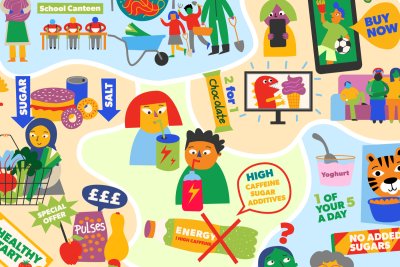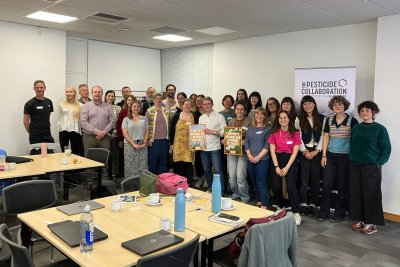Welcome to Sustain’s General Election hub. As we countdown to the 4th of July, there has never been a better time to talk to politicians about a better food system.
Here you will find our General Election toolkit, the Sustain manifesto and the latest food and farming election insights from Westminster and our network.
Our manifesto tracker explores political party commitments on food and farming and evaluates how these pledges align with the Sustain Manifesto 2024
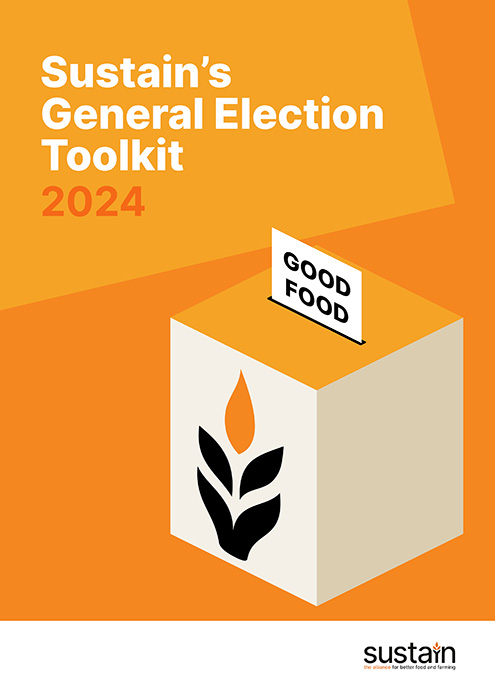
Sustain General Election Toolkit
Our toolkit equips you with everything you need for this election: key dates, campaigning guidelines, tips for engaging with your candidates and more…
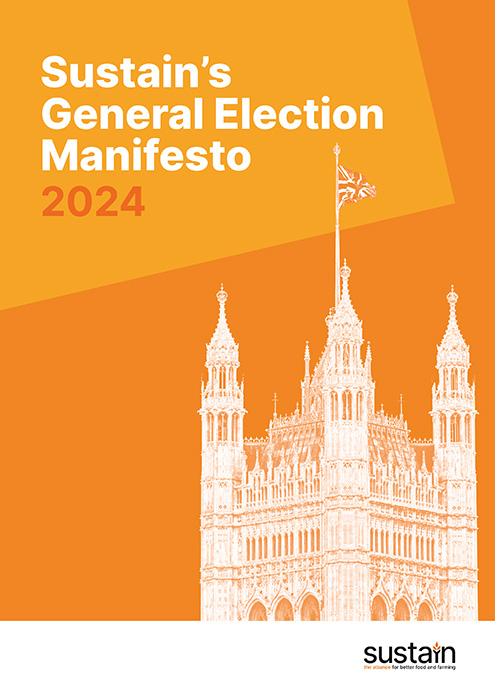
Sustain General Election Manifesto
We believe transforming the food system should be front and centre this election.
Sustain General Election Manifesto
At Sustain, we believe transforming the food system should be front and centre this election. We believe that changing the way we produce food can offer solutions to so many of the serious challenges we face as a society.
At the General Election we want to see:
- More support for agroecological farming and better routes to market in the UK.
- Food included in local and national climate and nature emergency plans and a halt to the expansion of factory farming.
- Healthy school food for all and an expansion of the school fruit and veg scheme.
- Expansion of Healthy Start and cash-first solutions to household food insecurity.
- Sustainable and healthy public sector food.
- Mandatory measures to get companies making food and drink healthier, and protecting children from unhealthy food and drink advertising and marketing.
- Establishment of a food partnership in every area across the UK.
- Real Bread on the menu of every school and more support for smaller Real Bread bakeries and their communities.
Sustain General Election Toolkit
Our toolkit equips you with everything you need for this election: key dates, campaigning guidelines, tips for engaging with your candidates and more…
Introduction
General elections are a fantastic opportunity to advocate for change and build relationships with those that will be holding the seats of power in the UK over the coming years. With the 2024 election called quickly, and significant changes in the makeup of parliament predicted, there has never been a better time to talk to politicians about a better food system.
At Sustain, we believe that changing the way we produce food can offer solutions to so many of the serious challenges we face as a society. A more affordable, healthier and sustainable food system will help tackle the cost of living, improve everyone’s chances of a long and healthy life, secure better livelihoods for nature-friendly farmers, and help to ensure a liveable climate whilst restoring the clean water and natural systems on which we all depend.
Many of the policies, standards, and the availability and priorities of large amounts of public funding, are decided by MPs and their advisors in Parliament. This is why the General Election to be held on 4 July 2024 is so important, and is the perfect time for our movement to come together and unite behind our shared vision of a better system of food and farming.
At the General Election we want to see:
- More support for agroecological farming and better routes to market in the UK.
- Food included in local and national climate and nature emergency plans and a halt to the expansion of factory farming.
- Healthy school food for all and an expansion of the school fruit and veg scheme.
- Expansion of Healthy Start and cash-first solutions to household food insecurity.
- Sustainable and healthy public sector food.
- Mandatory measures to get companies making food and drink healthier, and protecting children from unhealthy food and drink advertising and marketing.
- Establishment of a food partnership in every area across the UK.
- Real Bread on the menu of every school and more support for smaller Real Bread bakeries and their communities.
You can see the Sustain food and farming alliance’s full manifesto here.
Quick guide to the General Election 2024
Understanding the political context
Prime Minister Rishi Sunak has called the General Election for Thursday 4 July – an opportunity for people in every part of the UK to choose their Member of Parliament (MP). They will represent their constituency in the House of Commons for up to five years.
The UK is divided into 650 constituencies, with MPs elected by the first-past-the-post system. The candidate with the most votes becomes the MP for that area. The party that has the most MPs usually forms the next government.
You may want to take a look at some of the boundary changes for this year’s General Election, following a review in 2023. Some may coincide with local authority boundaries but more often they don’t. As a result, upper tier local authority areas often have more than one MP constituencies within them. Place-based organisations may want to consider engaging all of their candidates (and MPs after the election) if they have the capacity to do so.
Hundreds of current MPs have announced publicly that they are standing down at the forthcoming General Election, which will result in a large number of constituencies ending up with a new MP with the same political party or a different party altogether. You can see which MPs are standing down here.
This is a fantastic opportunity for our network and other groups interested in healthy and sustainable food and farming to ensure their future elected MP(s) champions good food in Parliament and future policy, funding and public debate.
You can see more information on the General Election on the Parliament website.
Some key dates
30 May – Dissolution of Parliament. All the business in both Houses (Commons and Lords) comes to an end and all MPs lose their seats in the House of Commons.
31 May – Pre-election period starts. This is the period in the run-up to the General Election that places restrictions on political activity and to avoid political parties using their power to gain an unfair advantage.
Note: Even though there is no clear guidance for local authorities on how they should act, they may still observe certain conventions during the pre-election period for a General Election. Other local authorities may issue their own guidance. To avoid issues, local authorities may delay events, bringing in new policies or starting public consultations.
7 June – Deadline for submitting or withdrawing a candidate nomination.
5 to 16 June – Main political parties expected to launch their manifestos.
18 June - Deadline for constituents to register to vote.
4 July – Election day. Everyone’s opportunity to take part in democracy and cast their vote: 7am to 10pm.
9 July – The newly elected MPs meet in Parliament for the first time. Members of the House of Commons take the oath, and members of the House of Commons elects a Speaker.
Note: If no party wins a majority of votes (for example, if there is a hung parliament, or a coalition needs to be formed), these July dates could be delayed.
17 July (tbc) – This is the likely date for the official State Opening of Parliament and King’s Speech.
23 July (tbc) – Parliamentary summer recess begins. Parliament does not sit in this period, the exact date may change due to the General Election. However, the elected Government and their teams will continue to work during recess, and freshly elected MPs are likely to be actively meeting people in their local constituencies, and organising their offices and priorities.
2 September (tbc) – End of Parliamentary summer recess in normal years, but this year, it may happen during late August with a shorter recess.
14 September to 2 October – Party Conference season begins. All major parties hold their annual conferences to set the policy direction for the coming year. Parliament is in recess in this period.
Rules for lobbying and campaigning
Our objective is not to influence the result of elections in favour of one candidate or party over another. Party political impartiality is vital for effective campaigning, and is part of the rules governing charities. We are encouraging organisations and individuals to engage all candidates and ensure good food and farming are central to their priorities in years to come, regardless of which political party wins the General Election and which MP ends up representing your constituency.
Campaigning must be undertaken under the constraints of the Lobbying Act. The guiding principle of the rules are to avoid party politics. Good food and farming, for health, fairness and the environment, should be a priority for everyone, regardless of political hue – and we should all feel confident and able to express this to the people seeking to be elected as our representatives.
The Lobbying Act encourages active participation by campaigners. Those advocating for policy change must understand the rules, avoid party politics or promoting particular candidates, keep records of relevant information, report regularly and be vigilant.
The rules limit the type of campaign activity, and the amount of money that can be spent on certain types of campaign activity, during an election period. The type of activity and communications that are regulated under the Lobbying Act are anything that could be seen as having the purpose of influencing how people will vote, in one direction or another.
For full guidance on the Lobbying Act and campaigning guidance, see the Electoral Commission’s website here.
Why should I engage?
What MP(s) can do for you and your organisation
MPs have a duty to represent their constituents and there is no better time to engage than in a General Election year. Meeting your MP or prospective parliamentary candidate strengthens their mandate to act and allows you to build a relationship.
Whether your MP is in Government, the Shadow front bench or on the backbenches, MPs have a duty to represent their communities. If they hold office in the elected Government, they are still able to help with problems affecting their constituents through all the usual methods and more.
More often, they will be backbenchers, who do not hold office in the Government or opposition’s Shadow Cabinet and sit behind the front benches in the House of Commons. MPs can write to a Minister on your behalf, ask a parliamentary question and help put your issues on the political map through debates, clarifying how policy should be implemented or funding allocated, or proposing new legislation. MPs may also be members of select committees, all party parliamentary groups or other interest groups, which gives them more leverage in certain policy areas.
Although MPs or prospective parliamentary candidates don’t always live or come from the geographical area in which they are seeking to be elected, there is an expectation that they will be invested in your area and prioritise your needs. Candidates and MPs closely monitor the concerns of their constituents because they have a duty to do so, and also rely on your vote to stay in office.
Don’t forget
MPs are often described as the ‘GPs of the political world’. They have broad knowledge over a vast range of issues, but due to time constraints, they may not have a deep level of knowledge over the topic you choose to discuss with them.
Your expertise and solutions may be of great interest and fill a gap in their knowledge and programme of work. Offering positive solutions, and demonstrating that these have local (and often national) support will help them to take an interest. MPs are extremely well connected and can open many doors for you.
Get involved
Identify your calls to action
The first step is to identify your priorities . Is it to establish a food partnership in your area? Is it to win funding for local food infrastructure such as a food hub, local food marketing, healthy food from local farmers in schools and hospitals, or support for farmer focused trading schemes in your area? Or would you like to see more government policy and action on healthy food, household food insecurity or sustainable and climate friendly food systems? Is there one call to action that stands out for you or your organisation?
Candidates will be busy meeting constituents during the campaign trail and it’s best to define your priorities and don’t shower them with multiple issues all at once. Your calls will be stronger and more impactful if you can demonstrate you represent many people and organisations and that if the candidate supports this, there would be lots of support for this.
You can use the General Election as an opportunity to galvanise your steering group and wider network of supporters around the issues that are important to you, your food partnership or organisation. Involve your networks and supporters in setting up key questions for candidates, define the top three to five priorities for candidates and/or invite your supporters to go to hustings armed with key questions for candidates.
Identify your local candidates or MP
You can identify who your current MP is via the website TheyWorkForYou or the Parliament website, and see here for a list of MPs standing down.
What is a PPC? ‘PPC’ stands for Prospective Parliamentary Candidate. They are standing at the General Election to represent your constituency. The larger parties (Conservatives, Labour, Liberal Democrats and Scottish National Party) tend to field a candidate in every constituency in the UK (or in Scotland, for the SNP).
The next step is to research who are the prospective parliamentary candidates (PPCs) standing in the General Election in your constituency (or constituencies if you are a place-based organisation with multiple constituencies).
The official candidate list will be published by 7 June 2024. Good sources of information are the pages of your local political parties, local media or websites such as Who Can I Vote For or Democracy Club (which also tells you of hustings in your area).
Research their interests and use that information to link them to your calls to action. Are they a farmer’s son or daughter? Are they a teacher or health professional? Were they on free school meals growing up? Were they employed in the food and farming industry at any point in their lives?
Write to candidates
Once candidates have been announced, which will happen by 7 of June at the latest, writing to them directly will be most effective (Appendix 1: template letter for candidates). Ask them questions, invite them to support your key calls to action and invite them to meet with you, visit your community group, centre local school or food growing space.
Publish and disseminate their answers to your supporters so their commitments are made public. Do share them with us if you can so we can build a map of support to key food and farming issues. If they become your MP, they will be in the position to represent you in Parliament and help you and your organisation make progress on your call to action.
Write to all main party candidates, not just those you think may win. It’s important to remain politically impartial, and you will be building connections, knowledge and public debate. In addition, even if a certain candidate doesn’t win, they may become interested in your call to action and support you in other ways.
Participate in hustings
Hustings are panel discussions where candidates debate policies and answer questions from the audience. They’re a great way to encourage candidates to make commitments on good food or other issues.
Many candidates publish a list of the hustings they will be participating in on their local websites. Check if environmental organisations such as Friends of the Earth or the local chamber of commerce are organising hustings. You can also invite members of your steering group and your supporters to go to hustings armed with key questions for candidates. (Appendix 2: template questions for hustings). You can email candidates in advance to let them know what questions you will be asking.
There will be other opportunities to interact face-to-face with your candidates. Candidates often go knocking door-to-door or stand at transport hubs and other busy spots handing out leaflets and interacting with their constituents.
Use all of these and other opportunities to interact with candidates, be prepared with your key calls to action and key questions, and urge candidates to make commitments in the areas that are a priority for you and your organisation.
Invite candidates for a site visit
Is there a food growing space, community kitchen, local school or other community food project that embodies your vision and tells a great story of what you would like to see supported in your community? Visiting and experiencing projects first-hand and communicating with local beneficiaries is a powerful way for candidates to understand the aims of your food partnership or organisation and get one step closer to make commitments. Candidates will be showered with priorities from individuals and organisations in their constituency. Seeing something first hand is more likely to stand out among their busy schedule, make them understand the importance of food and farming related issues and more likely to remember you and your organisation if they are eventually elected as MPs. If you can turn it into a photo opportunity for local press and social media, all the better!
Vote!
Don’t forget to exercise your democratic right and vote! The deadline for registering to vote is 18 June 2024, and the day to vote in person at your local polling station is 4 July, 7am to 10pm.
The deadline for applying for a postal vote is 5pm on 19 June, but you must already be registered to vote.
Congratulate your newly elected MP and arrange follow-up meetings
Regardless of your political preferences, it’s important to congratulate the elected MP and arrange a follow-up meeting. Hopefully by this stage you will have built a relationship with the winning candidate and they will be aware of the importance of your work. If your elected MP has made commitments relating to food and farming in their campaigns, build on this, encourage them to deliver on these promises and explore how you can help them to do so.
Using the resources identified earlier on this chapter, we encourage you to do some research on your MP once they are elected. You may want to follow them on X (formerly Twitter) or other social media channels that they regularly use, check out their website, join their mailing list and follow their maiden speech where they set out their priorities as an MP (you can usually find maiden speeches on YouTube and all speeches are shared on the Hansard website).
It’s important to note that the new cohort of MPs will be eager to hit the ground running, so we encourage you to use this time to engage with them, whether that’s through a meeting or a site visit. It’s important to keep the momentum going after the election, as this will be the perfect time to engage with them.
We have recently held a training session on engaging with your MP with our Sustainable Food Places network to prepare you for this stage: Pitch Perfect: get the most out of connecting with your MPs.
Devolved Administrations in the UK Nations
In addition to having representation in the UK Parliament, Wales, Scotland and Northern Ireland also have their own elected national assemblies or parliaments, and executive bodies. Also known as the ‘devolved administrations’, they have ‘devolved’ powers to legislate and govern on matters that relate to that nation, such as health and social care, education or local government. Other policy areas, such as defence, international trade or immigration, are ‘reserved’ and remain with the UK Parliament, so decisions made in Westminster directly affect all of the four UK Nations. You can find out more about the devolution settlements here.
Most food and farming-related policy areas are devolved. They include agriculture, health and social care and education. Therefore, if you and your organisation is based in Wales, Scotland or Northern Ireland you may decide to concentrate on calls to action that are UK-wide, such as international trade, or on national issues with local relevance and devolved powers such as school food.
It’s worth considering that even in those policy areas that are devolved, legislators often need to work with other administrations to make sure the policy or service is designed and delivered successfully. Different administrations can also learn from and be inspired by about what has worked elsewhere. For campaigning organisations, it’s often useful to compare progress across the four UK Nations and call for solutions across all nations so that we create a common playing field and avoid a ‘postcode lottery’ of service provision or action on issues of common concern.
Appendix 1: template letter to candidates
This is a suggested letter with questions for candidates. Do share their responses with us if you can. Adapt to your priorities by choosing what questions you want to include or include other key questions instead. Mention local organisation(s), farmer(s) or family(ies) that you or your organisation have supported through a project. Give local examples, facts and statistics – they go down a lot better with candidates.
Subject: Ensuring a healthy, sustainable and resilient food system for... [constituency]
Dear [XXX],
I am writing to you on behalf of [food partnership or organisation]. We are [short description of your aims and who you represent].
Food and farming have become ever more important issues over recent years. One in seven workers in the UK is employed in the food system which contributes over £120 billion to the UK economy. Food and farming are critical for our national security. However, almost half of fruit and veg farmers fear going out of business next year, one quarter of people in the UK are living with obesity that increases the risk of serious health issues, and farming is a leading cause of river pollution and biodiversity loss, whilst farmers committing to nature-friendly methods are struggling to make a living.
Creating a resilient food system must be a top priority in national policy, and we are approaching candidates from the main political parties inviting them to answer five questions. The responses will be publicly shared with our growing network of individuals and supporter organisations in [constituency or local area] and the national Sustainable Food Places network, which works with food partnerships, local authorities and communities in over 90 towns, cities and regions across the UK.
We commend the leadership you have shown on food and farming issues, including [XXX]. We would like to invite you to visit [the project] and would welcome the start of a conversation with you and your team on how you could build on this leadership to support everyone in [constituency or local area].
Farming
A record number of farmers are at risk of going out of business, and are at the sharp end of unfair trading practices by supermarkets and food manufacturers. What incentives will you champion as an MP for farmers and the big businesses who buy their food, to accelerate the transition to nature-friendly farming, grow our local food economy and ensure farmers are treated fairly?
Climate and nature
How will you ensure this includes more comprehensive and ambitious
Thanks to a recent court ruling, the new government will be required to release a new climate change plan in the next 12 months. How will you ensure this contains more comprehensive and ambitious plans to prevent climate breakdown, especially for agriculture and land use?
Our rivers are in dire ecological state and pollution from intensive livestock is a leading cause.. What do you propose to do as an MP to clean up our rivers from this source of pollution?
Also, a long-waited reform of public sector food failed to materialise before the General Election. What will you do as an MP to ensure public sector food procurement for schools and hospitals drives healthier diets and support for low-carbon and nature-friendly farming?
Children
Healthy school meals introduce children to a lifetime of enjoyable food and sociability. They also boost attainment and attendance, increase a child’s lifetime earnings, improve household food security, help families save on food costs, improve diet quality and help combat food related ill health such as diabetes and heart disease, saving the NHS money in the long term. What will you do as an MP to ensure all children, regardless of their income or background, are able to have a healthy, nutritious meal every day in school?
Health
Everyone deserves to be healthy no matter where they live. We need our next government to make sure healthier food is the easiest, affordable option for everyone. What action will you take as an MP to improve access to healthy and affordable food for everyone, such as through Healthy Start food vouchers for families, and incentives or rules for companies to switch away from producing and advertising unhealthy food?
Household food security
One in five households with children and almost half of households on Universal Credit reported experiencing food insecurity in 2024. However, our local authorities are cash strapped and Household Support Fund comes to an end in September 2024. What will you do as an MP to ensure that everyone has access to good food and ensure a long-term solution to local welfare support to help your constituents if they experience financial crisis?
Local action and food citizenship
Local authorities have experienced significant cuts to the public health grant and have limited capacity and powers to tackle unhealthy food advertising and prevalence of unhealthy food takeaways. As an MP, will you strengthen national planning policies and guidance to support the development of healthy food environments and support a food partnership and plan in every local area?
Appendix 2: template key questions to candidates
These are suggested questions you can pick if you get the opportunity to go to a hustings or meet your candidates. Feel free to come up with your own! Mention local organisation(s), farmer(s) or family(ies) you or your organisation have supported through a project. Give local examples, facts and statistics – they go down a lot better with candidates.
Sustainable farming
Q1: There’s a record number of farmers at risk of going out of business, and at the sharp end of unfair trading practices by supermarkets and food manufacturers. What incentives will you champion for farmers and the big businesses who buy their food to accelerate the transition to nature-friendly farming, grow our local food economy, and make sure farmers are treated fairly?
Clean rivers
Q2: Our rivers are in dire ecological state and pollution from intensive livestock units is a leading cause. How do you propose to do to clean up our rivers from this source of pollution?
The Climate Emergency
Q3: We are in a climate emergency and the High Court has ruled the government’s climate plans to be unlawfully weak, and ordered the plan to be re-written within 12 months. What more comprehensive and ambitious policies would you introduce to reduce emissions from farming, our diets, and land use?
Public Sector Food
Q4: Also, a long-waited reform of public sector food failed to materialise before the General Election. What will you do as an MP to ensure the food served to some of our most vulnerable people - school children and hospital patients - drives healthier diets and support for low-carbon and nature-friendly farming?
Children’s food
Q5: Healthy school meals introduce children to a lifetime of enjoyable food and sociability. They also boost attainment and attendance, increase a child’s lifetime earnings, improve household food security, help families save on food costs, improve diet quality and help combat food related ill health. What will you do to ensure all children, regardless of their income, age or background, are able to access a healthy, nutritious meal every day in nursery or school?
Q6: Everyone deserves to be healthy no matter where they live. We need our next government to make sure healthier food is the easiest, affordable option for everyone. [XX%] of reception children are living with overweight and obesity in [area] and this increases to [XX%] by the time children leave primary school [check the figures for your area in England in this LGA website]. What action will you take to improve access to healthy and affordable food for low-income families, such as through Healthy Start food vouchers. And what will you do to incentivise or make rules for companies to switch away from advertising unhealthy food?
Household food insecurity
Q7: One in five households with children and almost half of households on Universal Credit reported experiencing food insecurity in 2024. However, our local authorities are cash strapped and Household Support Fund comes to an end in September 2024. What will you do as an MP to ensure that everyone has access to good food and ensure a long-term solution to local welfare support to help your constituents if they experience financial crisis?
Food partnerships
Q8: [Name of food partnership] has produced a food strategy and food action plan bringing together key stakeholders in [area] including the Council, academics, food businesses and voluntary sector organisations. How will you support this strategy and action plan and will you support a food partnership and plan in every local area?
Alternatively, if there isn’t a food partnership, strategy or food plan in place: Many local areas in the UK now have a food partnership and plan in place. In Scotland every local area will need to have in place, by law, a Good Food Nation Plan by 2026. Will you pledge to support a food partnership and plan in every local area across the UK?
Election calls from other Sustain campaigns
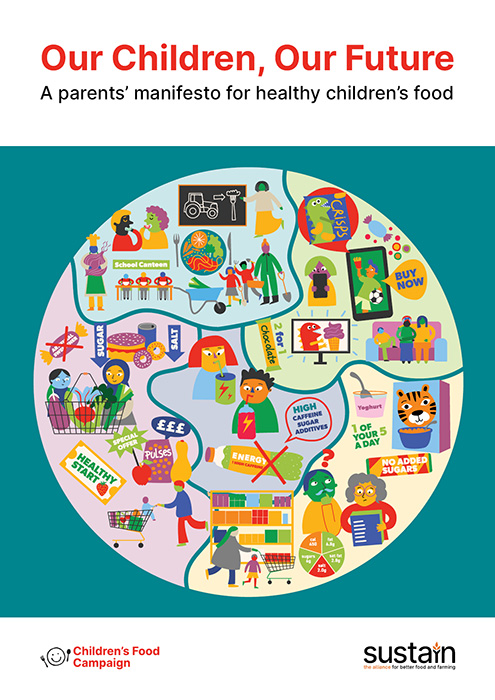
Children’s Food Campaign
Our Children, Our Future: A parents' manifesto for healthy children's food.
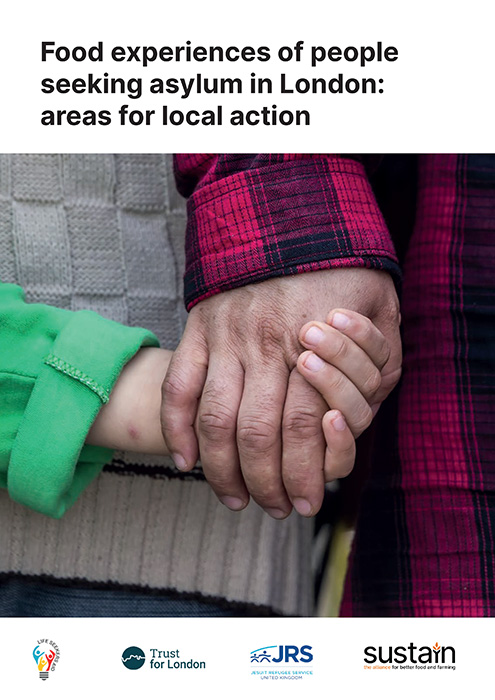
London Food Poverty Campaign
Food experiences of people seeking asylum in London: areas for local action.
More election calls from our projects and alliance members
- Obesity Health Alliance
Action on obesity - Food Foundation
Nourishing the Nation - School Food Matters
Standards for school food - Real Bread Campaign
Support small independent bakers - Nature Friendly Farming Network
Sustainable farming - Soil Association
Sustainable farming - Pesticide Action Network (and Pesticide Collaboration)
Action to reduce pesticides - River Action
Action for clean rivers - Wildlife & Countryside Link
Nature 2030 policy asks for nature restoration - Wildlife Trusts
Policies for wildlife and the natural environment - Friends of the Earth
Comparison of green policies across the main political parties - Green Alliance
Tracking environmental policy and politics

